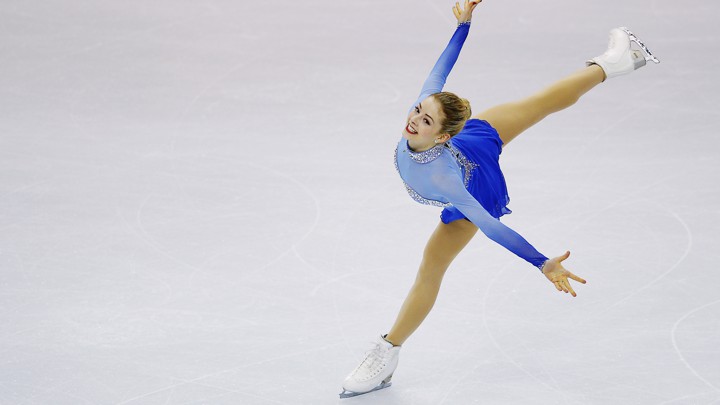Ashley Wagner says she was sexually assaulted by John Coughlin

In a video and written piece that she wrote in USA Today, Wagner, an Olympic bronze medalist and US national champion in figure skating, said she was sexually assaulted by former figure skater John Coughlin when she was 17 years old and when he was 22.
 Coughlin, a two-time US pairs champion, killed himself in January at age 33.
Coughlin, a two-time US pairs champion, killed himself in January at age 33.
His death came a day after he was suspended from US Figure Skating by the US Center for SafeSport, which investigates all forms of abuse in sport, amid a pending grievance, to which Coughlin denied wrongdoing. SafeSport closed the investigation after his death.
"What happened to Ashley should not happen to anyone, period," US Figure Skating spokeswoman Barbara Reichert said in a statement to CNN on Thursday.
 "Ashley is incredibly strong; not just to have the courage to come forward with her story, but to share her experience publicly to help others.
"Ashley is incredibly strong; not just to have the courage to come forward with her story, but to share her experience publicly to help others.
"Ashley recently spoke at US Figure Skating athlete safety seminars and her experience and message of empowerment had a profound impact on skaters and their parents.
"Further, Ashley's perspective has helped us expand the scope of our athlete safety initiatives and education and words cannot express how much we appreciate her sharing her story with our members."
Wagner won bronze for the US in the 2014 Sochi Olympic Winter Games and was a US national champion in 2012, 2013 and 2015.
 "Over the past few months, as I decided to tell this story, I wrestled with using John's name," Wagner, now 28 and retired from the sport, wrote.
"Over the past few months, as I decided to tell this story, I wrestled with using John's name," Wagner, now 28 and retired from the sport, wrote.
"He was a prominent figure skater who died by suicide in January, and so I fully understand the issues with naming him. But a name can shape so much of how my story is perceived. Without it, I know people will question my credibility."
#MeToo movement
Wagner said that she was in Colorado Springs, Colorado in June 2008, attending a figure skating camp, and she attended a party with friends at a house.
She wrote that it was her first time at a party and the first time she tried alcohol. Later, she said, no one was able to drive her back to the hotel where she was staying, so she and other girls spent the night.
"It felt safe," Wagner said. "My friends were there. I was offered up a bed and didn't think twice about taking it, and soon drifted off to sleep."
It was in the middle of the night, Wagner says, when Coughlin sexually assaulted her.
"I thought he just wanted a place to sleep," Wagner said. "But then he started kissing my neck. I pretended to be deep asleep, hoping he would stop. He didn't.
"When his hands started to wander, when he started touching me, groping my body, I tried to shift around so that he would think I was waking up and would stop. He didn't."
As it continued, Wagner said she pulled away and told him to stop, which she says he did.
"In 2008, I didn't have the knowledge and empowerment that came with the #MeToo movement," Wagner said. "No one had explained consent to me. Something that was so ambiguous then is very clear now. I was sexually assaulted."
'Good people can hurt you too'
At the time, Wagner kept quiet, she said, because of her figure skating career.
"I was a young skater coming up through the ranks in a judged sport," she said. "I didn't want to stir the pot. I didn't want to add anything to my career that would make me seem undesirable or dramatic.
"I didn't want to be known in figure skating as the athlete who would cause trouble. And I genuinely didn't feel like anyone would listen to me anyway. Everyone really liked this guy. I even liked him.
"How could someone so beloved do such a bad thing? As I think back on it, this is the most important part of my story. Good people can hurt you too.
"Just because someone is nice, just because they seem to do all the right things, just because they make people laugh, doesn't mean they are incapable of hurt or abuse. No one is all good or all bad, but the good parts can't justify the hurt that is caused.
"I now know that regardless of the events of that night, I got into that bed thinking I was safe to just fall asleep. He was the one who took away that safety."
Wagner said she decided to come forward to help make the sport safer after watching Alysa Liu become a US national champion at age 13.
"It is not normal for kids and teenagers to be in the same social environment as adults," Wagner said.
"But in figure skating, it happens all the time. Thirteen-year-old girls can be on the same international team as 21-year-old men, traveling on the same flights, staying in the same hotels, eating all of their meals together."





.jpeg)
Comments
Post a Comment